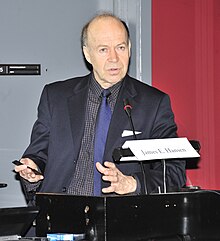by Craig Axford | Nov 27, 2013 | Research

Giving new meaning to "the check's in the mail." (Courtesy Shutterstock)
[Craig Axford]
In this opinion piece, Keith Wagstaff states that Switzerland will be the first developed nation to adopt a basic income guarantee (BIG) should voters there approve it. If that happens, Wagstaff argues it may force other countries, including the United States, to begin giving BIG another look. Though this is an approach that draws support from both the right and the left, according to the author, it would be impossible to get a BIG proposal through the current Congress.
Keith Wagstaff, “Why the US government should send you $3000 for doing nothing”, The Week, November 14, 2013: https://theweek.com/article/index/252828/why-the-us-government-should-send-you-3000-for-doing-nothing
by Craig Axford | Nov 27, 2013 | News

Dr. James Hansen, former head of NASA's Goddard Institute for Space Studies (source: Wikipedia)
[Craig Axford]
Dr. James Hansen, former head of NASA’s Goddard Institute for Space Studies, argues in this blog post that a fee on carbon that is paid back to every citizen is the best way to tackle climate change. This so-called ‘fee and dividend’ is similar to a basic income guarantee, but the fee would exceed the monthly dividend in the case of the greatest carbon emitters. However, all of the money collected via the fee would be distributed back to the public each month and would disproportionately favor both low income individuals and families as well as low carbon emitters.
Dr. James Hansen, “Fee & 100% Dividend”, Open Source Systems, Science, Solutions, November 29, 2008: https://ossfoundation.us/projects/environment/economics
by Craig Axford | Nov 24, 2013 | Research

Maniza Naqvi is a Senior Social Protection Specialist working on Safety Nets in Malawi and Ethiopia.
[Craig Axford]
According to the Word Bank’s Maniza Naqvi, Alaska and Iran have something important in common: they both use revenues generated from their mineral resources to provide direct payments to their citizens.

Marcelo Giugale, World Bank’s Director of Economic Policy and Poverty Reduction Programs for Africa
World Bank economist Marcelo Guigale, also supports directly transferring money generated from oil, gas, and mineral development into the pockets of people. He argues this both strengthens the economy and reduces corruption. African nations in particular currently stand to see the greatest income gains by sharing the wealth generated from their rich mineral deposits with their citizens.
Maniza Naqvi, “Mining Mineral Revenues”, Nasikiliza “I am listening”: Stories of development from the World Bank in Africa, June 22, 2013.
Marcelo Giugale, “A Latin Solution to an African Problem“, The Huffington Post, May 30, 2012.
by Craig Axford | Nov 23, 2013 | Research

Hugh Segal
[Craig Axford]
This article discusses Conservative Canadian Senator Hugh Segal who continues to advocate for a basic income guarantee. According to Senator Segal an income floor would encourage more entrepreneurship, enhance consumer spending, and provide a top up for low paying service jobs that are increasingly a barrier preventing many Canadians from joining the middle class.
Bruce Stewart, “Canadian Senator Hugh Segal and his guaranteed income plan”, Beacon News, October 7, 2013.
by Craig Axford | Nov 21, 2013 | Research

Bernard Omondi got $1,000 from GiveDirectly.
[Craig Axford]
New research coming out of MIT’s Poverty Action Lab provides additional evidence that unconditional grants given to the poor tend to be spent in constructive ways. Carol Bellamy, a former UNICEF director, stated that she was “impressed” by the results of the study adding, “The return on investment was more positive than I would have anticipated.”
David Kestenbaum, “What Happens When You Just Give Money To Poor People?”, NPR, October 25, 2013.




